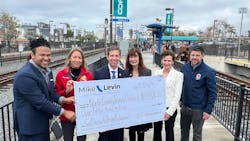USDOT awards more than $4.9 billion in funding through Mega and INFRA grants
The U.S. Department of Transportation (USDOT) has awarded more than $4.9 billion in funding to 37 projects through two major discretionary grant programs, the National Infrastructure Project Assistance (Mega) grant program and the Infrastructure for Rebuilding America (INFRA) grant program.
The Mega program, which was created by the Infrastructure Investment and Jobs Act (IIJA) and provides $5 billion in funding through 2026, is focused on projects that are uniquely large, complex and difficult to fund under traditional grant programs. The INFRA program, for which funding was increased more than 50 percent by the IIJA, also funds large scale, transformational infrastructure projects. More than half of the projects being funded through the INFRA program are in rural communities.
“With this announcement, we are advancing projects so large, complex and ambitious that they could not get funded under the infrastructure programs that existed prior to the Biden administration,” said USDOT Secretary Pete Buttigieg. “Our INFRA and Mega programs are helping build the cathedrals of American infrastructure: Truly transformative projects that will change entire regions and our entire country for the better.”
Some of the selected Mega projects for this round include:
- $600 million to the Interstate Bridge Replacement Program between Portland, Ore., and Vancouver, Wash. The project will update Interstate 5—a critically important north-south route-- with a seismically resilient replacement of the I-5 bridge over the Columbia River. The update will make the bridge more resilient and better able to handle future challenges, including correcting structural weaknesses, seismic risks and congestion issues, which currently occur regularly and impede both commuters and freight trucks. The bridge will be designed with specialized lanes for public and commercial travel. Additionally, the new bridge will offer accessible and affordable transportation options such as bus lanes, pedestrian walkways, bike lanes and a light-rail system to promote sustainable transportation.
- $130 million to the St. Lucie River Railroad Bridge Replacement Project. The project will replace the existing 100-year-old St. Lucie River Railroad Bridge in Florida with a new double-track structure with significantly improved clearance. The project addresses increasing conflicts between maritime needs for longer or more frequent bridge openings and rail needs for shorter and less frequent bridge closings. The project supports both freight and passenger rail, with the new Brightline rail service between Orlando and south Florida expected to add 32 bridge crossings daily while also decreasing the potential for blocked grade crossings and vehicle collisions.
Some of the additional selected INFRA projects for this round include:
- $53.9 million to replace the 108-year-old San Dieguito River Railway Bridge in Del Mar, Calif. Replacement of this bridge is part of Phase II of the San Dieguito Bridge Replacement, Double Track and Special Events Platform Project. The award will complement the $100 million the North County Transit District (NCTD) and the San Diego Association of Governments (SANDAG) were awarded in April from the State of California’s Transit and Intercity Rail Capital Program for the project. NCTD and SANDAG have also requested an additional $98 million from the state to fully fund the project. The project also includes nearly a mile of new double track and construction of a special events platform at the Del Mar Fairgrounds. The improvements will add capacity to the Los Angeles-San Diego-San Luis Obispo (LOSSAN) intercity rail corridor, increasing ridership, improving operational reliability and reducing greenhouse gas emissions in the region. The LOSSAN Corridor supports COASTER commuter rail, Amtrak Pacific Surfliner intercity rail and BNSF freight operations in San Diego. Increased service frequencies afforded by the project will enhance national priorities to improve the movement of freight, reduce vehicle miles traveled, support climate action, create jobs, foster social equity and provide mobility.
- $34 million to the District of Columbia in Washington, D.C., to construct the East Capitol Street Corridor from Burns Street to Southern Avenue. The project will improve multimodal access to community businesses, recreation and services in the area through improved pedestrian facilities, bicycle lanes, bus stop improvements and transit access. The project is expected to significantly reduce crashes, fatalities, and injuries, particularly for pedestrians and bicyclists and enhance transit with a new bus route and dedicated bus stops that will be easier to use in a designated Historically Disadvantaged Community.
- $28 million to complete the Elko Nevada Rail Corridor Enhancement Project. The project will design and construct improvements on the Union Pacific Railroad (UP) Overland Route at the UP Elko Yard. The improvements include two new power-operated crossovers between existing bi-directional tracks and a new right-hand crossover connection track so trains can be diverted around the yard during freight train work events, new yard track extensions to accommodate work events in the rail yard off the main tracks, improved walking surfaces in the yard and upgraded infrastructure and new or enhanced track and wayside signal infrastructure, including an interface with an existing Positive Train Control system. The project will address known rail vulnerabilities and upgrade railroad infrastructure and assets. The project will also benefit Amtrak operations by consolidating the Amtrak boarding platform for eastbound and westbound travelers, which provides more direct and accessible connections between the boarding platform, transit and parking.
A combined $300 million in funding from both the Mega and INFRA program will go to the Port of New Orleans for a new International Container Terminal in New Orleans, La. The new terminal will be an alternative to terminals located farther inland on the Mississippi River, which cannot accommodate larger vessels. It will be fully outfitted with a 1,700-foot wharf, an automated stacking crane yard, utilities, operations buildings, gates and an intermodal rail yard. The project is receiving approximately $74 million in Mega funds and $226 million in INFRA funds.
Applicants for Mega, INFRA and Rural grants were evaluated under USDOT’s Multimodal Project Discretionary Grant (MPDG) application, a combined application designed to reduce the administrative burden of applying for grants that allowed applicants to apply for all three programs with the same application.
USDOT received 117 applications requesting $24.7 billion in Mega funding and 190 applications requesting $24.8 billion from the INFRA program, far exceeding the amounts of funding available.
Applications for the MPDG grants were evaluated based on the criteria published in the Notice of Funding Opportunity in summer 2023. The criteria include safety, state of good repair, economic impacts, freight movements and job creation, climate change, resilience and the environment, equity, multimodal options and quality of life and innovation areas such as technology, project delivery and financing. USDOT also considered cost effectiveness and project readiness in evaluating the more than 300 MPDG applications received.
The next application period is expected to open in mid-2024. The full list of Mega and INFRA grants awarded can be found on USDOT’s website.
About the Author
Brandon Lewis
Associate Editor
Brandon Lewis is a recent graduate of Kent State University with a bachelor’s degree in journalism. Lewis is a former freelance editorial assistant at Vehicle Service Pros in Endeavor Business Media’s Vehicle Repair Group. Lewis brings his knowledge of web managing, copyediting and SEO practices to Mass Transit magazine as an associate editor. He is also a co-host of the Infrastructure Technology Podcast.

